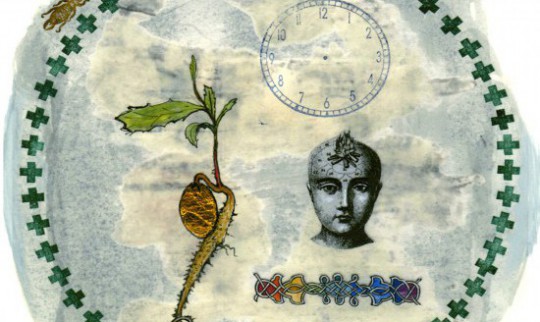Finnegans Wake, the final book by Irish writer James Joyce, is a bit like the alien language in the movie Arrival. As the film’s spaceships tower mysteriously over the Earth, so Joyce’s book casts its strange shadow over world literature. Most literary minded people are aware of the text’s presence, but no one actually knows how to read the book, save for a select few who claim it is the greatest thing ever written.
In order to read Finnegans Wake, you must become a translator. You must translate the text out of it’s idiosyncratic, multilingual semi-nonsensical language, and into… music? For example, see Rebecca Hanssens-Reed’s interview with Mariana Lanari, about the process of translating the Wake into music.
For the last three years I’ve pursued the music that is Finnegans Wake. I organize an ongoing project called Waywords and Meansigns, setting the book to music. This week we release our latest audio, which is 18 hours of music created by over 100 musicians, artists and readers from 15 countries. We give away all the audio for free at our website (and you can even record your own passage, so get involved!)
Listen to a clip of the project here!
It might sound strange, but translating the book into music is easier than, say, translating it into another foreign language. But that hasn’t deterred Fuat Sevimay, who translated the book into Turkish, nor has it stopped Hervé Michel, who calls his French rendering a “traduction” rather than a “translation.”
For our 2017 release, we had fun with the book’s impossible nature by creating a few meta-translation pieces. Evan Goodchild, who produces music as the box sets, teamed up with a host of bona fide translators to set their literary translations of Finnegans Wake to music. The new release also includes a bit of Philippe Lavergne’s French translation of the Wake, as read by Geneviève Lévesque in the recording from her band, Les orages de janvier.
Backed by hip-hop-meets-techno beats, you can hear Krzysztof Bartnicki read his own Polish translation, Yehuda Vizan reading his Hebrew translation, as well as Hervé Michel’s French “traduction.” Roman Tsivkin reads Henry Volokhonsky’s Russian “transcription,” and just for good measure, Evan Goodchild also musically backed author Peter Chrisp reading a passage from the original text.
Check out the track from Yehuda Vizan and the box sets below, and head over to www.waywordsandmeansigns.com to hear the rest!
Derek Pyle is director of Waywords and Meansigns. You can also visit him at www.derekdpyle.com.
*****
Read More About Exciting New Translation Projects:

